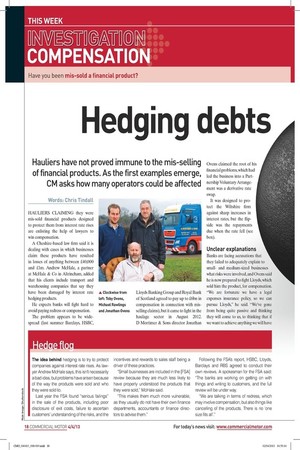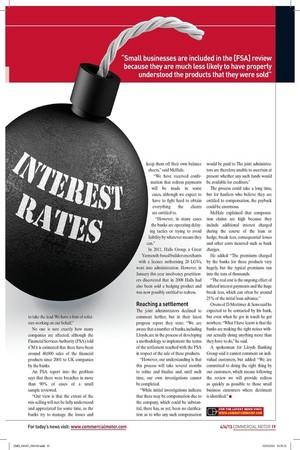Hedging debts Hauliers have not proved immune to the mis-selling
Page 12

Page 13

If you've noticed an error in this article please click here to report it so we can fix it.
of financial products. As the first examples emerge, CM asks how many operators could be affected Words: Chris Tindall HAULIERS CLAIMING they were mis-sold financial products designed to protect them from interest rate rises are enlisting the help of lawyers to win compensation.
A Cheshire-based law firm said it is dealing with cases in which businesses claim these products have resulted in losses of anything between £40,000 and £1m. Andrew McHale, a partner at McHale & Co in Altrincham, added that his clients include transport and warehousing companies that say they have been damaged by interest rate hedging products.
He expects banks will fight hard to avoid paying redress or compensation.
The problem appears to be widespread (last summer Barclays, HSBC, Lloyds Banking Group and Royal Bank of Scotland agreed to pay up to £6bn in compensation in connection with misselling claims), but it came to light in the haulage sector in August 2012. D Mortimer & Sons director Jonathan Ovens claimed the root of his financial problems, which had led the business into a Partnership Voluntary Arrangement was a derivative rate swap.
It was designed to protect the Wiltshire firm against sharp increases in interest rates, but the flipside was the repayments due when the rate fell (see box).
Unclear explanations Banks are facing accusations that they failed to adequately explain to smalland medium-sized businesses what risks were involved, and Ovens said he is now prepared to fight Lloyds, which sold him the product, for compensation. "We are fortunate we have a legal expenses insurance policy, so we can pursue Lloyds," he said. "We've gone from being quite passive and thinking they will come to us, to thinking that if we want to achieve anything we will have to take the lead. We have a firm of solicitors working on our behalf."
No one is sure exactly how many companies are affected, although the Financial Services Authority (FSA) told CM it is estimated that there have been around 40,000 sales of the financial products since 2001 to UK companies by the banks.
An FSA report into the problem says that there were breaches in more than 90% of cases of a small sample reviewed.
"Our view is that the extent of the mis-selling will not be fully understood and appreciated for some time, as the banks try to manage the losses and keep them off their own balance sheets," said McHale.
"We have received confirmation that redress payments will be made in some cases, although we expect to have to fight hard to obtain everything the clients are entitled to.
"However, in many cases the banks are operating delaying tactics or trying to avoid liability by whatever means they can."
In 2011, Halls Group, a Great Yarmouth-based builders merchants with a licence authorising 20 LGVs, went into administration. However, in January this year insolvency practitioners discovered that in 2008 Halls had also been sold a hedging product and was now possibly entitled to redress.
Reaching a settlement The joint administrators declined to comment further, but in their latest progress report they state: "We are aware that a number of banks, including Lloyds, are in the process of developing a methodology to implement the terms of the settlement reached with the FSA in respect of the sale of these products.
"However, our understanding is that this process will take several months to refine and finalise and, until such time, our own investigations cannot be completed.
"While initial investigations indicate that there may be compensation due to the company, which could be substantial, there has, as yet, been no clarification as to who any such compensation would be paid to. The joint administrators are therefore unable to ascertain at present whether any such funds would be available for creditors."
The process could take a long time, but for hauliers who believe they are entitled to compensation, the payback could be enormous.
McHale explained that compensation claims are high because they include additional interest charged during the course of the loan or hedge, break fees, consequential losses and other costs incurred such as bank charges.
He added: "The premiums charged by the banks for these products vary hugely, but the typical premiums run into the tens of thousands.
"The real cost is the ongoing effect of inflated interest payments and the huge break fees, which can often be around 25% of the initial loan advance."
Ovens of D Mortimer & Sons said he expected to be contacted by his bank, but even when he got in touch he got nowhere. "What I have learnt is that the banks are making the right noises without actually doing anything more than they have to do," he said.
A spokesman for Lloyds Banking Group said it cannot comment on individual customers, but added: "We are committed to doing the right thing by our customers, which means following the review we will provide redress as quickly as possible to those small business customers where detriment is identified." • The idea behind hedging is to try to protect companies against interest rate rises. As lawyer Andrew McHale says, this isn't necessarily a bad idea, but problems have arisen because of the way the products were sold and who they were sold to.
Last year the FSA found "serious failings" in the sale of the products, including poor disclosure of exit costs, failure to ascertain customers' understanding of the risks, and the incentives and rewards to sales staff being a driver of these practices.
"Small businesses are included in the [FSA] review because they are much less likely to have properly understood the products that they were sold," McHale said.
"This makes them much more vulnerable, as they usually do not have their own finance departments, accountants or finance directors to advise them." Following the FSA's report, HSBC, Lloyds, Barclays and RBS agreed to conduct their own reviews. A spokesman for the FSA said: "The banks are working on getting on with things and writing to customers, and the full review will be under way.
"We are talking in terms of redress, which may involve compensation, but also things like cancelling of the products. There is no one size fits all'."









































